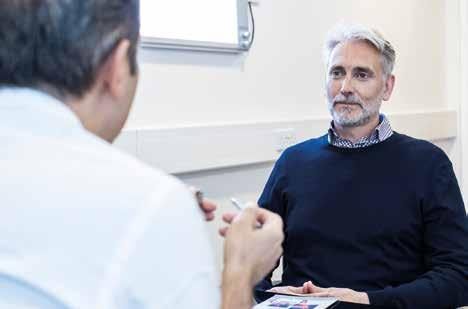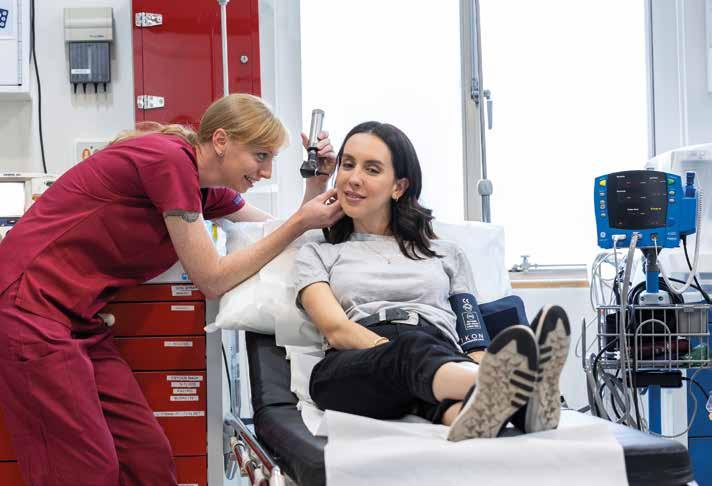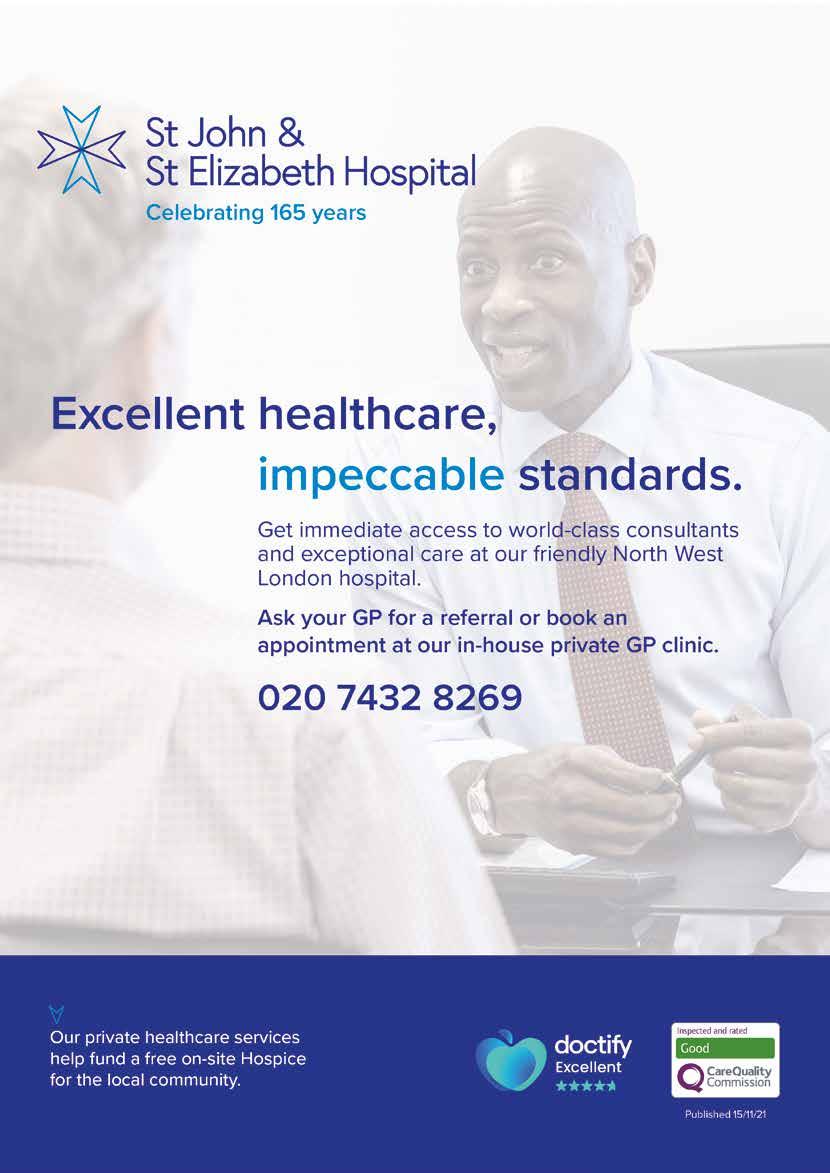
6 minute read
Healthcare
The UK Healthcare System Explained
Migrating to another country to live or work is exciting, but there are many practicalities that need to be dealt with, especially when it comes to healthcare.
Many expatriates who move to the UK find it hard to understand how the healthcare system works here. To help you, St John & St Elizabeth Hospital have put together a guide which introduces the NHS and explains how to register with them; how to access private healthcare services; and sets out some of the main differences between the NHS and the private system. This guide has been created with the help of Lindsay Walker, who works at the US Chamber of Commerce.
A Brief Introduction To The NHS
The NHS (National Health Service) provides free and significantly subsidised healthcare. It spans the whole country and includes GPs (General Practitioners), dentists, pharmacists, hospitals, optometrists, the ambulance service, therapists, and many more specialists. It launched in 1948, with the aim of providing good quality medical care to all, regardless of social status or income.
Nowadays, the NHS provides free care to anyone that lives in the UK, including foreign nationals, as long as they are legal residents, pay taxes and contribute to the NHS. This includes routine exams, pregnancy scans and check-ups, emergency care, treatment for chronic conditions and surgery.
As an American in Britain, you can access both the NHS and private healthcare depending on what you want and need, but first you’ll need to get yourself set up and registered with a local GP.
How To Register
GP surgeries have catchment areas, which means you’ll need to live within a specific zone in order to register. If you don’t know whether your postcode (zip code) qualifies, call your local GPs and check if your address falls within their catchment area.
Once you’re sure a GP practice will accept you, you’ll need to bring various pieces of paperwork when you register. Your passport or identity document won’t be enough – they will also need to see proof of address, such as a Council Tax statement or utilities bill dated within the last three months.
The NHS can be strict about registration when you’re from abroad, and if you move around London regularly, it can be hard to understand what services are actually available to you. As such, it’s always best to call your local GP before going in person, to make sure they’ll take you on as a patient, and check what their requirements are.
Healthcare Contributions
As a foreign national, you pay an excess healthcare surcharge. This is a fee that’s structured by year and varies depending which visa you have. You will have paid this upfront as part of your initial visa application. Once you’ve moved to the UK and have registered with a GP, you’ll be able to access the NHS immediately (there’s no qualifying period after which you’re eligible for free healthcare). If you’ve moved here with children under 16 and/or a partner (who lives with you permanently), they will also be eligible for free NHS treatment.
Every legal foreign resident is entitled to free emergency treatment, but depending on the situation, you might be asked to pay for inpatient treatment once the emergency has passed, so make sure to check with your doctor to avoid any surprise bills!
It’s worth remembering that some services, like prescriptions or dentists, aren’t free, but are heavily subsidised. Prescriptions currently cost £9.35 per item, but if you take a number of medications, you could buy a prescription prepayment certificate (PPC). A 3-month PPC costs £30.25 and 12-months costs £108. This will cover all your NHS prescriptions, including NHS dental prescriptions, no matter how many items you need. Dentist treatments fall into four bands. Band one costs £23.80 and covers general check-ups and scans; band two costs £65.20 and covers minor treatments such as fillings, band three costs £282.80 and covers more complicated procedures such as bridges, crowns, and dentures, and band four costs £23.80 and covers emergency dental such as fixing fillings, ulcers and draining an abscess.
UK And American Healthcare - What Are The Main Differences?
If you decide to stick with NHS services, you won’t necessarily get to build a relationship with your practitioner as you would in the US. Whereas in the US you always tend to see the same practitioner, in the UK you’ll be assigned whichever GP is free at the time of your appointment. It’s completely normal here, especially in London, never to see the same doctor twice.
In the US, you might have insurance, go to hospital, discover you’re not covered, and have to go elsewhere, whereas in the UK you’re entitled to free care at any NHS hospital.
In the US, people have annual exams that come with health insurance, whereas in the UK we don’t have annual check-ups, like women’s health or eye tests. This means people can go for years without a health check, and could end up not having the treatments that they need.
The Benefits Of Private Healthcare In The UK
Inevitably, when affordable healthcare is offered on such a large scale, it’s going to be in high demand. Moreover, in the case of a public-funded body with limited resources, demand is quickly going to exceed supply. Nowadays, it’s very normal to be waiting for some NHS treatments for months or even years. It’s no surprise then that one of the main benefits of private healthcare is reduced waiting times. Going private can mean the difference between waiting years or just days.
Consultants and GPs at private hospitals see fewer patients, but that doesn’t mean they spend less time working. On the contrary, doctors spend more time with their patients and will often stay with them during their health journey. This one to one personalised care isn’t something that happens frequently on the NHS.
Private hospitals aren’t held back by a stretched budget that means compromising on comfort. This means they can invest money into employing world-class consultants, buy the newest and most effective equipment, and create a relaxing environment for patients. For example, at St John & St Elizabeth Hospital, we’re in the process of opening our new £35m wing, the single largest investment into the hospital to date.
Top Tips For Picking Your Healthcare
• Research the NHS and private healthcare so that you have a really clear picture about your options, especially depending on your history and specific situation • Remember that where you live will affect the clinics and services you can access.
So make sure you understand your local rules and processes! • If you have private insurance, make sure you fully understand your package. If this is via your work, ask an HR professional in your company to give you a run down so that you fully understand your cover and what’s available to you • Make sure to register with the
NHS, just in case anything serious happens, or if you have pre-existing conditions which might not be covered by your insurance • It’s a good idea to blend NHS and private. If you want something dealt with urgently, a more streamlined journey, or want to see a specific practitioner, private is the way to go • Research Shared Care Agreements.
These allow you to see a private doctor for diagnosis and treatment, and then transfer your prescription over to the
NHS to reduce costs.
Founded in 1865, St John & St Elizabeth Hospital is one of the UK’s largest independent charitable hospitals
All treatments in the hospital help fund the onsite St John’s Hospice, which provides free care to over 4,500 people and their families each year.
GET IN TOUCH St John & St Elizabeth Hospital 60 Grove End Road, London, NW8 9NH Telephone: 020 7806 4000 Website: www.hje.org.uk












